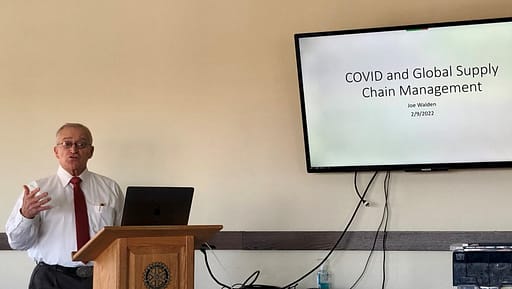The supply chain is getting lots of attention these days and lots of blame for our economic woes. Who better to make sense of it all than Joe Walden, associate teaching professor at Kansas University and expert on supply chain management.
Walden is a retired U.S. Army Colonel with an extensive background in logistics. He also holds advanced degrees in engineering management, operational planning, systems management and logistics, and curriculum and teaching. Presently his focus is on supply chain security and reverse logistics. In addition to his professional accomplishments, Walden is a three -time world champion weight lifter in his weight class.
When things are working as they should, the supply chain is invisible. The supply chain is made up of organizations, people, activities, information, and resources involved in moving a product or a service to the end user. When something disrupts part of the supply chain, like a pandemic, it can have a ripple effect through out the system.
Our economy operates on a “just in time” model which means local inventories can run short if there is a disruption to the supply chain. Presently, on-time deliveries are at an all-time low due, in part, to chip shortages, port backlogs, business closures, and shortages of workers. Labor and fuel costs are pushing prices up, but Walden asserts that some of the price increases are opportunistic. Hoarding makes things worse as panic buying creates shortages and drives up prices. Demand eventually falls and producers reduce production, creating another shortage on down the road. An additional factor adversely affecting the economy is a 25% return rate on online purchases, creating a huge problem for retailers.
Walden is optimistic that these problems are being addressed. For example, a “just in case” approach to the supply chain has had some success. This strategy involves better planning, a need forecasting, preparedness, resiliency, and a better focus on the customer. He also believes the growth in small truck deliveries has created new jobs and reduced the reliance on a large-truck shipping model. Walden says he tries to inspire at least one person every day–which seems like a great goal for us all.
